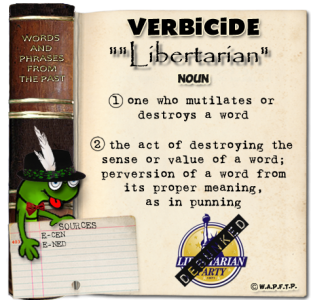Why I Won’t Call Myself a Libertarian Anymore
Download this spoken discourse. (MP3)
By: Shane Radliff [social title=”” subtitle=”” link=”www.youtube.com/libertyunderattack” icon=”fa-youtube-play”]
June 16th, 2016
 Early on in my anarchist days, I preferred to call myself a “libertarian”, since that was least offensive to those within the mainstream public. This then evolved into a term I heard Kyle Rearden use called “anti-political libertarian”, in order to distinguish between the anti-libertarian “Libertarian” Party gang, and libertarianism as consistently applied. That said, over the past few months I have noticed myself using that term less, and anarchist more.
Early on in my anarchist days, I preferred to call myself a “libertarian”, since that was least offensive to those within the mainstream public. This then evolved into a term I heard Kyle Rearden use called “anti-political libertarian”, in order to distinguish between the anti-libertarian “Libertarian” Party gang, and libertarianism as consistently applied. That said, over the past few months I have noticed myself using that term less, and anarchist more.
Now, I am dropping the label completely: the word “libertarian” has fallen prey to verbicide.
Briefly defined, verbicide is “a deliberate distortion of the sense of a word.” Another example of this would be the word “gay”. Back in my grandparents’ days, “gay” simply meant “happy”, although now it primarily means “homosexual.”
Let’s also take a look at a few varying definitions of “libertarianism.”
Samuel Edward Konkin defined it as “free-market anarchism.” The “Libertarian” Party tends to define it as either “Minimum Government, Maximum Freedom”, or “socially liberal and fiscally conservative.”
L. Neil Smith provides a more eloquent definition:
“A libertarian is a person who believes that no one has the right, under any circumstances, to initiate force against another human being, or to advocate or delegate its initiation. Those who act consistently with this principle are libertarians, whether they realize it or not. Those who fail to act consistently with it are not libertarians, regardless of what they may claim.”
Konkin and Smith’s definition match how I understand it, as well.
The “Libertarian” Party’s definition, on the other hand, more closely matches the rhetoric of the Founding Founders, which makes sense considering “Constitutional Republicanism” is a major part of their platform. In my opinion, the “Libertarian” Party is the most responsible for the bastardization of this philosophy—they are simply a reincarnation of the Constitution Party of the 1990s. That, and also the influx of “Never Trumpers” and disgruntled Republicans into the party. Much like the takeover of the Tea Party by neo-conservatives, the co-opting has already begun and will continue.
To be fair, the term “anarchism” isn’t necessarily “pure” either with the advent of “anarchist politicians.” This includes James Weeks, Jeff Wood, Darryl W. Perry, and even celebritarian, Adam Kokesh, among others—even this anti-State ideology has been tainted with the consistently-failed strategy of reformism—political anarchism, much? Although, anarchism is relatively safe from falling victim to verbicide, due to its etymology; you can’t call yourself an anarchist (“against all rulers”), and advocate for yourself or others to violently subjugate all of those within society.
I am also perfectly fine with the labels of “voluntaryist” and “agorist”, and see them to be relatively immune from corruption. Someone can call themselves a “libertarian” and choose whatever variation in definition that fits their agenda; it’s much like the government’s laws today that most of them despise and seek to reduce—its “open to interpretation.” On the other hand, if someone calls themselves a “voluntaryist” or an “agorist” there are stringent philosophical and actionable requirements.
For example, Voluntaryist.com’s Statement of Purpose explains that:
“Voluntaryists are advocates of non-political, non-violent strategies to achieve a free society. We reject electoral politics, in theory and in practice, as incompatible with libertarian principles. Governments must cloak their actions in an aura of moral legitimacy in order to sustain their power, and political methods invariably strengthen that legitimacy. Voluntaryists seek instead to delegitimize the State through education, and we advocate withdrawal of the cooperation and tacit consent on which State power ultimately depends.” [Emphasis added]
“The goal of agorism is the agora. The society of the open marketplace as near to untainted by theft, assault, and fraud as can be humanly attained is as close to a free society as can be achieved. And a free society is the only one in which each and every one of us can satisfy his or her subjective values without crushing others’ values by violence and coercion.”
Konkin also explains his opposition to “partyarchy”:
“Partyarchy, the anti-concept of pursuing libertarian ends through statist means, especially political parties.”
To briefly summarize the previous quotations, agorism and voluntaryism both reject the political means explicitly.
That said, it’s interesting to see the polarization within libertarianism and even anarchism. Many vote in “self-defense,” and some take a gradualist approach; in other words, “limited” government/anarchism won’t come overnight, and therefore, “‘we’ should vote in candidates who will give ‘us’ more time and/or remove laws from the books”; though, the chances of an LP candidate actually getting elected into office is slim to none, as has been the trend.
As someone who advocates for the cancellation of voter registration, I’ve gotten in heated debates with many whom participate in electoral politics, and have been called a “purist” for not providing my sanction in elections; “we” are also accused of “hurting the movement.” That said, “Purist” is used in a manner that is intended to be “derisive”, but I take it as a compliment: is it really that reprehensible that I live my principles consistently on a daily basis and seek out economic means solutions that are actually, or potentially, efficacious?
My thesis for this article was that libertarianism has fallen prey to verbicide and has become corrupted. It does not mean adherence to the non-aggression principle (NAP); hell, most of the third-party candidates had no clue what the NAP was when asked in debates, or, in the case of Austin Petersen, he knows what it is, but outright rejected it. I also witnessed this at the local LP meeting I attended: the NAP was not even brought up once.
It doesn’t mean self-ownership either. Many libertarians believe that the government has no say about what one puts into their own body, and some believe that abortion should remain outside the purview of government; though, most political libertarians fail on one significant point, and that is “Constitutional taxation.”
Back in a 1985 debate with Robert Poole, the founder of Reason magazine, Konkin explained this phenomenon succinctly:
“The corruption of political labels is a historic fact since the day the first political label arose. Any of you who have had the barest history of political science…know that the words “liberal”…the “Whigs”…what does liberalism mean now?”[Emphasis added]
As an aside, Konkin also mentioned that they complained about the term being corrupted in New Libertarian #12. Unfortunately, it is not available on the Internet, therefore no direct articles are available.
It’s worth mentioning that I am not collectivizing everyone who calls themselves “libertarian” and applying these critiques to them; as was stated previously, I used to call myself one, and have consistent colleagues that utilize the label, especially in the context of what the word means etymologically. Rather, I am critiquing its mainstream, bastardized interpretation, and pointing out that just because someone calls themselves a “libertarian,” does not mean they are.
For that reason and the others mentioned, I will no longer call myself one, unless I’m unlucky enough to commit a Freudian slip. I will utilize “anarchist” and “voluntaryist” exclusively, and hopefully “agorist” in the near future.
In closing, I would encourage everyone to conduct their own circuit of political field trips and witness government firsthand.
For more great content like this, please consider donating to Liberty Under Attack. Alternatively, sign up for a free trial through Audible, receive a free audiobook, and help support us in the process.

